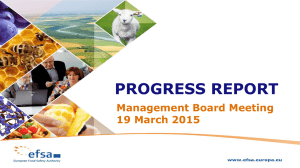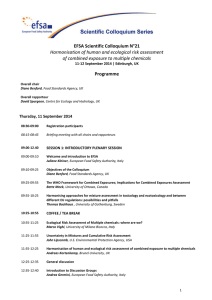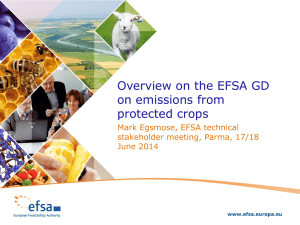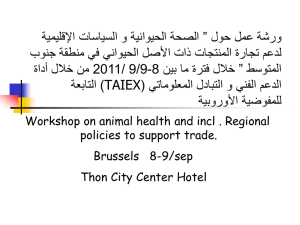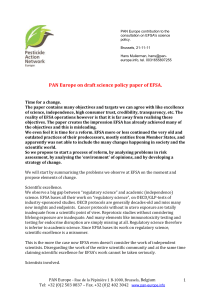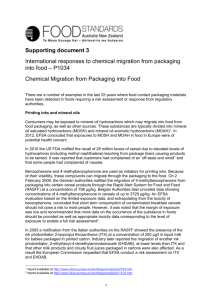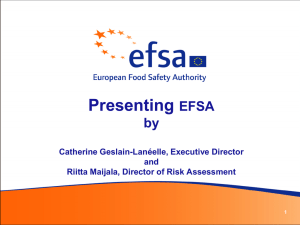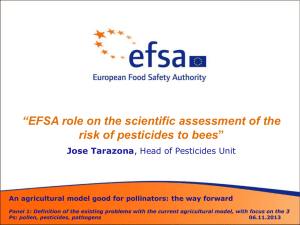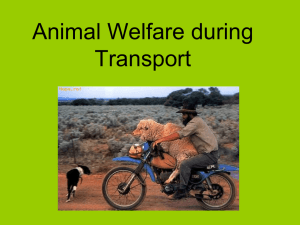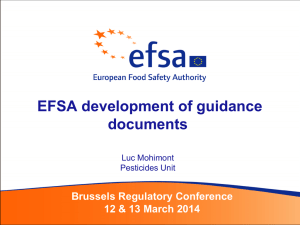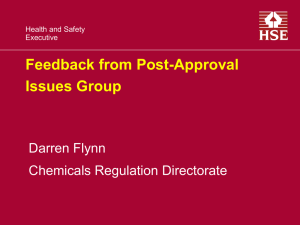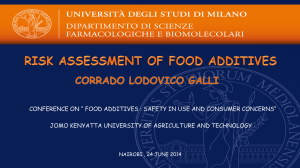EFSA structure
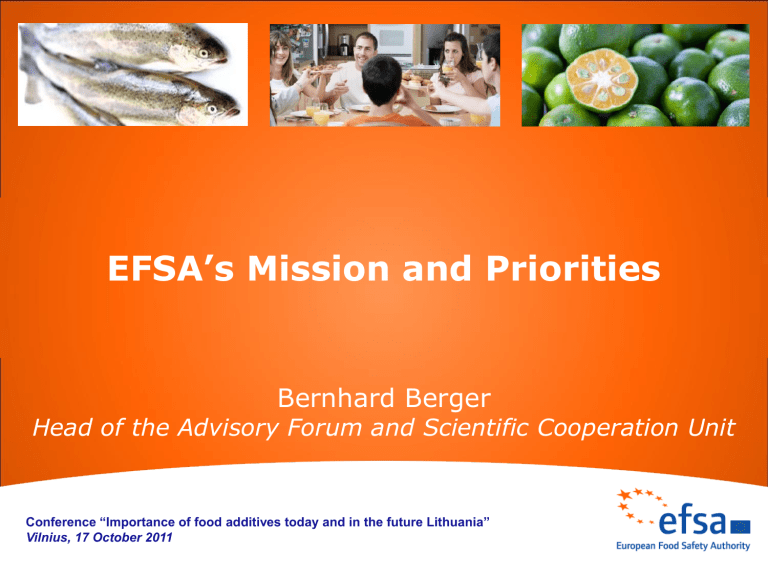
EFSA’s Mission and Priorities
Bernhard Berger
Head of the Advisory Forum and Scientific Cooperation Unit
Conference “Importance of food additives today and in the future Lithuania”
Vilnius, 17 October 2011
The presentation
Who we are
How we work
The way ahead
2
The presentation
Who we are
How we work
The way ahead
3
4
Regulation 178/2002 sets three main objectives for EFSA
Scientific and technical support of
EFSA helps to
Improve EU food safety
Re-build consumer confidence in EU food safety
Re-build confidence of trading partners in the EU food supply
5
EFSA structure
Management
Board
+
Executive Director
+
Advisory
Forum
+
Scientific Committee and Panels
=
6
Risk Analysis Framework
RISK ASSESSMENT
Science based
RISK MANAGMENT
Policy based
RISK
COMMUNICATION
Interactive exchange of information and opinions concerning risks
Key values of EFSA
• Excellence in science
• Independence
• Responsiveness
• Openness and transparency
The presentation
Who we are
How we work
The way ahead
9
EFSA’s Panels
Plant Health
Plant Protection
Biological food chain hazards
Genetically modified organisms
Animal health and welfare and their diseases
Animal feed
Food chain contaminants
Food additives
Flavourings and
Processing aids
Dietary, nutritional and novel food
Food packaging 10
Risk Assessment at EFSA
Receipt of request
Assessment
Adoption & Communication
From
• European Commission
• European Parliament
• EU Member States or
• on EFSA’s own initiative
Allocation to
Panel(s)
• Identifying experts, setting up a
Working Group
• Declaring interests
• Extensive literature research
• Reviewing data
• Scientific cooperation
• Draft opinion
• Incl stakeholder consultations
• Finalisation and adoption by
Panel
• Opinion send to requesting body
• Publication & communication
Meeting Thomson Reuters, 26 January 2011
11
Publication of our outputs:
The EFSA Journal
• Re-launched in December 2009
• Indexed in bibliographic databases
• Subscribe to get monthly Table of Content http://www.efsa.europa.eu/en/publications/efsajournal.htm
12
Independence
Experts in Scientific Committee, Scientific
Panels or in their working groups
• Experts do not represent Member States, organisations or stakeholders
• Declaration of interest of expert
Excellence in Science
• Selection of Panel members (every three years) and experts to Working Groups (via the
Expert Database) is based on scientific excellence
• Panels adopt scientific opinions
• Risk assessment methodologies and guidance
• Scientific colloquia and workshops
Cooperation between
EFSA and Member States
• Advisory Forum
• Focal Points
• Scientific networks
EFSA and MS: working together
• Cooperation with all competent authorities responsible for food safety in Europe (e.g. food safety agencies)
• Over 400 research institutes in Member States
(Art36 Network)
• > 1000 external scientific experts
The presentation
Who we are
How we work
The way ahead
17
Strategic Plan of EFSA
EFSA has identified six key strategic areas and objectives to guide the Authority over the 5 years (2009-2013)
Key strategic areas
1. Integrated approach for scientific advice
2. Timely, high-quality evaluation of products, substances and claims
3. Coordinate data collation, dissemination and analysis
4. Be at the forefront of risk assessment methodologies and practices in Europe and internationally
5. Reinforce confidence and trust in EFSA and the EU food safety system effective risk communication & dialogue with partners and stakeholders
6. Assure the responsiveness, efficiency and effectiveness of EFSA
19
Future challenges
• Globalisation and new / re-emerging risks
• Innovative technologies and new science
• Sustainability and climate change
• Societal changes
• Changes in policies and the regulatory framework
20
EFSA’s vision
To become globally recognised as the
European reference body for risk assessment on food and feed safety, animal health and welfare, nutrition, plant protection and plant health
21
Getting involved
• If you want regular information on risk assessment:
From EFSA: Subscribe to the Table of Contents and
RSS of the EFSA Journal
From other MS: ask the Lithuanian Focal Point for access to the risk assessment output of other
Member States via the Information Exchange
Platform
Getting involved
• If you want to carry out work for EFSA:
Apply to calls for proposals to be awarded a grant in line with Article 36 of EFSA’s Founding Regulation
Apply to calls for tenders (procurement)
Getting involved
• If you are an expert you may want to:
Sign up to the Expert Database to join the pool of experts
Express your interest to become a Seconded
National Experts within EFSA
apply for Traineeship on risk assessment via BTSF
(in 2012)
apply to attend scientific colloquia organised by
EFSA http://www.efsa.europa.eu
Thank you for your attention
